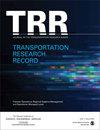具有碰撞风险目标的最短路径问题
IF 1.8
4区 工程技术
Q3 ENGINEERING, CIVIL
引用次数: 0
摘要
随着与驾驶、交通和道路状况相关的数据越来越多,人们对交通事故风险和相应风险因素的预测建模重新产生了兴趣。特别是最近提出了新的机器学习方法,其目标是预测实际事件或替代事件的发生,或估计特定时间间隔、路段或两者兼而有之的驾驶风险。同时,正如我们的回顾所证明的那样,规范性的建模文献(例如,路线或卡车调度)尚未利用这些进步。事实上,对驾驶风险意识模型的研究几乎完全集中在危险材料运输(具有非常明显的风险概况)上,并且经常假设每英里行驶的事故风险是固定的。我们提出了一个框架,用于开发具有风险标准的数据驱动规定性优化模型,用于传统卡车运输应用。这种方法与最近开发的机器学习模型相结合,可以预测中期(未来20分钟到一小时的驾驶时间)的驾驶风险,从而产生双目标最短路径问题。我们进一步提出了一种基于k最短路径算法的解决方法,并说明了如何使用它。本文章由计算机程序翻译,如有差异,请以英文原文为准。
Shortest Path Problems with a Crash Risk Objective
With more and more data related to driving, traffic, and road conditions becoming available, there has been renewed interest in predictive modeling of traffic incident risk and corresponding risk factors. New machine learning approaches in particular have recently been proposed, with the goal of forecasting the occurrence of either actual incidents or their surrogates, or estimating driving risk over specific time intervals, road segments, or both. At the same time, as evidenced by our review, prescriptive modeling literature (e.g., routing or truck scheduling) has yet to capitalize on these advancements. Indeed, research into risk-aware modeling for driving is almost entirely focused on hazardous materials transportation (with a very distinct risk profile) and frequently assumes a fixed incident risk per mile driven. We propose a framework for developing data-driven prescriptive optimization models with risk criteria for traditional trucking applications. This approach is combined with a recently developed machine learning model to predict driving risk over a medium-term time horizon (the next 20 min to an hour of driving), resulting in a biobjective shortest path problem. We further propose a solution approach based on the k-shortest path algorithm and illustrate how this can be employed.
求助全文
通过发布文献求助,成功后即可免费获取论文全文。
去求助
来源期刊

Transportation Research Record
工程技术-工程:土木
CiteScore
3.20
自引率
11.80%
发文量
918
审稿时长
4.2 months
期刊介绍:
Transportation Research Record: Journal of the Transportation Research Board is one of the most cited and prolific transportation journals in the world, offering unparalleled depth and breadth in the coverage of transportation-related topics. The TRR publishes approximately 70 issues annually of outstanding, peer-reviewed papers presenting research findings in policy, planning, administration, economics and financing, operations, construction, design, maintenance, safety, and more, for all modes of transportation. This site provides electronic access to a full compilation of papers since the 1996 series.
 求助内容:
求助内容: 应助结果提醒方式:
应助结果提醒方式:


